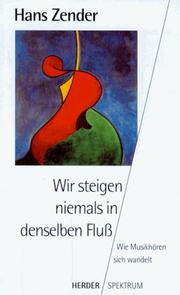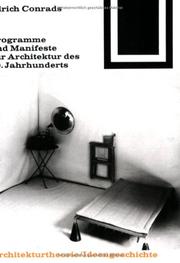| Listing 1 - 9 of 9 |
Sort by
|
Book
ISBN: 8416868840 9788416868841 Year: 2017 Publisher: Madrid: Casimiro,
Abstract | Keywords | Export | Availability | Bookmark
 Loading...
Loading...Choose an application
- Reference Manager
- EndNote
- RefWorks (Direct export to RefWorks)
"La grande différence entre classiques et modernes consiste en ceci : c'est que les classiques produisaient de l'art à la façon de la nature et que les modernes reproduisent la nature à la façon de l'art. C'est une différence essentielle, qui relève de la conscience de la vie et qui amène, ou pas, à pouvoir considérer la beauté comme une faculté indépendante de l'esprit humain" Theo van Doesburg
Book
ISBN: 0853311048 Year: 1969 Publisher: London : Lund Humphries,
Abstract | Keywords | Export | Availability | Bookmark
 Loading...
Loading...Choose an application
- Reference Manager
- EndNote
- RefWorks (Direct export to RefWorks)
Art, Modern --- Art --- Form (Aesthetics) --- Forme (Esthétique) --- Philosophy. --- Philosophie

Abstract | Keywords | Export | Availability | Bookmark
 Loading...
Loading...Choose an application
- Reference Manager
- EndNote
- RefWorks (Direct export to RefWorks)
Zender, Hans --- Essays --- Esthetica --- Muziekfilosofie --- Sociologie --- Politiek --- Compositie --- Messiaen, Olivier (1908-1992) --- Cage, John (1912-1992) --- Scelsi, Giacinto --- Lachenmann, Helmut --- Hindemith, Paul --- 20e eeuw --- Schubert, Franz (1797-1828)
Book
Year: 1968 Publisher: Amsterdam : Den Haag : Athenaeum : Polak & Van Gennep ; Bert Bakker,
Abstract | Keywords | Export | Availability | Bookmark
 Loading...
Loading...Choose an application
- Reference Manager
- EndNote
- RefWorks (Direct export to RefWorks)
Book
Abstract | Keywords | Export | Availability | Bookmark
 Loading...
Loading...Choose an application
- Reference Manager
- EndNote
- RefWorks (Direct export to RefWorks)
Artists --- Architecture --- Artistes --- Biography. --- History --- Biographie --- Histoire --- Doesburg, Theo van,
Book
ISSN: 11611960 ISBN: 9782840562382 2840562383 Year: 2008 Publisher: Paris: École nationale supérieure des beaux-arts,
Abstract | Keywords | Export | Availability | Bookmark
 Loading...
Loading...Choose an application
- Reference Manager
- EndNote
- RefWorks (Direct export to RefWorks)
Les Principes fondamentaux de l'art néo-plastique, traduits pour la première fois en français par Isabelle Ewig et Didier Semin, ont été publiés en 1925 chez Albert Langen dans la collection des Bauhausbücher (livres du Bauhaus). Ces Principes fondamentaux de l'art néo-plastique, par leur forme d'essai synthétique, sont emblématiques de la démarche de Theo van Doesburg, et figurent en bonne place dans la bibliothèque idéale de l'art moderne au côté des ouvrages de Kandinsky, Klee ou Mondrian.
kunsttheorie --- De Stijl --- neo-plasticisme --- Doesburg, Theo van --- Néo-plasticisme --- Van Doesburg, Théo --- Ecrit d'artiste --- van Doesburg, Theo --- kunsttheorie. --- De Stijl. --- neo-plasticisme. --- van Doesburg, Theo. --- UMBO (pseud.).
Book
ISBN: 9783037786291 3037786299 3037786299 9783037786291 Year: 2020 Publisher: Zürich: Lars Müller,
Abstract | Keywords | Export | Availability | Bookmark
 Loading...
Loading...Choose an application
- Reference Manager
- EndNote
- RefWorks (Direct export to RefWorks)
Theo van Doesburg was a jack of all trades : painter, writer, architect, typographer, and art theorist. In this volume of the Bauhausbücher, he attempts to make elementary concepts in the visual arts generally comprehensible. He was addressing the "modern artist" of his day, who had to deal with both shifting social paradigms and a changing understanding of art and art theory. Van Doesburg describes theory as a necessary consequence of creative practice. Artists, he says, "do not write about art but from within art."
Bauhaus --- Théorie de l'art --- Art --- Art, Modern --- Form (Aesthetics) --- Van Doesburg, Théo
Book

ISBN: 0728704692 Year: 1985 Publisher: [London] : Arts Council of Great Britain,
Abstract | Keywords | Export | Availability | Bookmark
 Loading...
Loading...Choose an application
- Reference Manager
- EndNote
- RefWorks (Direct export to RefWorks)
Painting, Spanish --- Peinture espagnole --- Exhibitions --- Expositions --- Torres-García, Joaquín, --- Exhibitions.


ISBN: 9783035602784 9783764363536 3035602786 Year: 2014 Publisher: Basel Birkhäuser
Abstract | Keywords | Export | Availability | Bookmark
 Loading...
Loading...Choose an application
- Reference Manager
- EndNote
- RefWorks (Direct export to RefWorks)
| Listing 1 - 9 of 9 |
Sort by
|

 Search
Search Feedback
Feedback About UniCat
About UniCat  Help
Help News
News